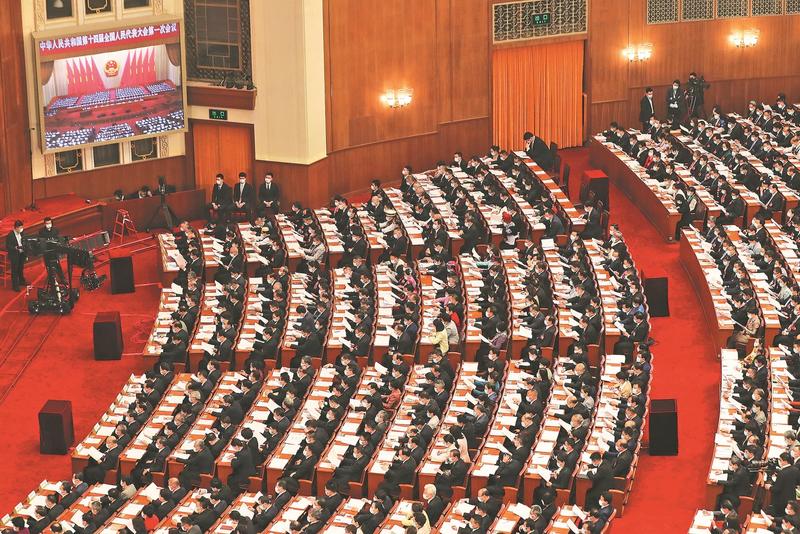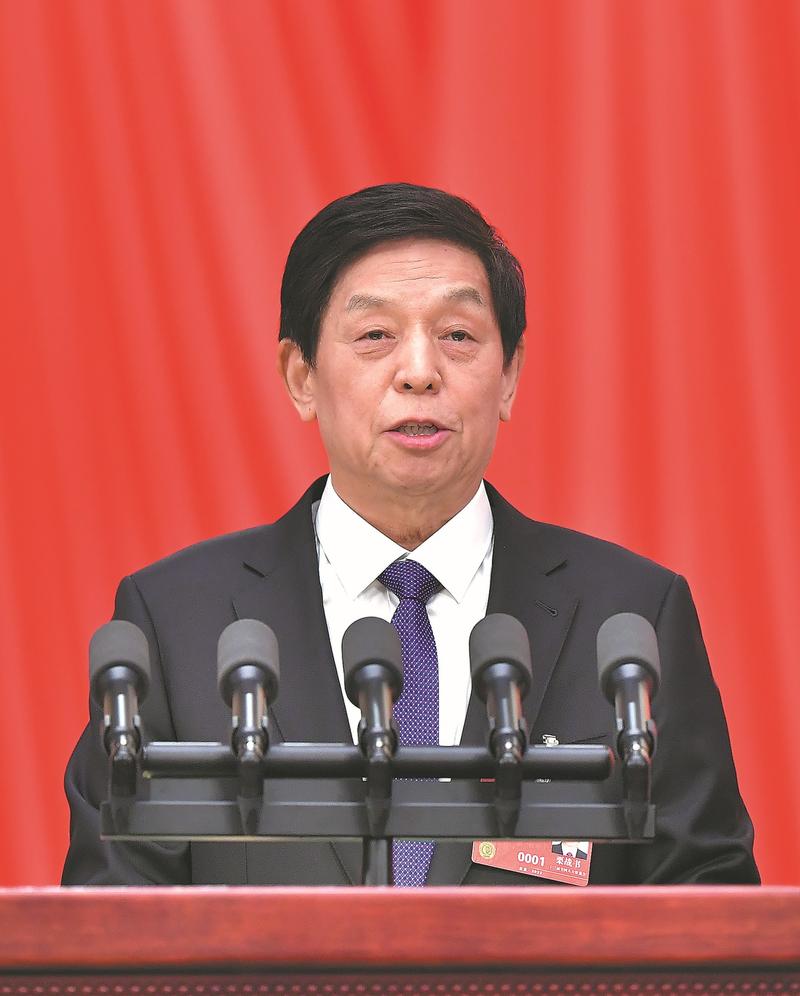 Deputies participate in the second plenary meeting of the first session of the 14th National People's Congress in Beijing on March 7, 2023. (WANG ZHUANGFEI / CHINA DAILY)
Deputies participate in the second plenary meeting of the first session of the 14th National People's Congress in Beijing on March 7, 2023. (WANG ZHUANGFEI / CHINA DAILY)
China's national sovereignty, security and development interests have been safeguarded over the past five years as its legislation in this regard was further strengthened, according to a report delivered on Tuesday by the nation's top legislator.
From 2018 to 2022, several new laws relating to national security were formulated, including the Biosecurity Law, the Data Security Law and the Land Border Law, according to the work report of the Standing Committee of the 13th National People's Congress delivered by Li Zhanshu, chairman of the 13th NPC Standing Committee.
President Xi Jinping, who is also general secretary of the Communist Party of China Central Committee and chairman of the Central Military Commission, attended the meeting with other Party and State leaders.
The report, which was submitted on Tuesday for review to the ongoing first session of the 14th NPC, China's top legislature, showed that some other laws in this area, including the Counter-Terrorism Law, the National Intelligence Law and the Maritime Traffic Safety Law, were also revised during the period.
Li Zhanshu, chairman of the 13th NPC Standing Committee, said that legislation in foreign-related fields had been strengthened over the past five years, with the enactment of the Law on Countering Foreign Sanctions and the Export Control Law, adding that "the legal system for opposing foreign sanctions, interference and long-arm jurisdiction has also been improved"
Recalling the top legislature's diplomatic work over the past five years, Li said, "A major task in the work is stepping up to the front lines of any legal, political or diplomatic struggle whenever the country requires, without the slightest hesitation, to defend China's sovereignty, security and development interests."
Li said that legislation in foreign-related fields had been strengthened over the past five years, with the enactment of the Law on Countering Foreign Sanctions and the Export Control Law, adding that "the legal system for opposing foreign sanctions, interference and long-arm jurisdiction has also been improved".
ALSO READ: Legislature urged to safeguard national sovereignty, interests
Draft laws on foreign relations and foreign state immunity were also deliberated by the 13th NPC Standing Committee, according to the report.
All of these items of legislation concerning foreign-related affairs have provided legal protection for the interests of the country and its people, it added.
The work report showed that the Law on International Mutual Legal Assistance in Criminal Matters was formulated and the Criminal Procedure Law was amended in the five-year period, providing the legal means for pursuing fugitives who had fled abroad and for recovering stolen State assets.
In addition, a series of laws concerning military issues were also made and revised, which helped to strengthen the rule of law in national defense and military development, it added.
 Li Zhanshu, chairman of the Standing Committee of the 13th National People's Congress, delivers a work report at the second plenary meeting of the first session of the 14th National People's Congress on March 7, 2023. (PHOTO / XINHUA)
Li Zhanshu, chairman of the Standing Committee of the 13th National People's Congress, delivers a work report at the second plenary meeting of the first session of the 14th National People's Congress on March 7, 2023. (PHOTO / XINHUA)
It noted that deputies to the 13th NPC had an enhanced awareness of performing their duties during their five-year term, adding that they better played their role as an important bridge and channel through which the Party and State stay in touch with the people.
While helping deputies to improve the ability to perform their duties, the 13th NPC Standing Committee also enhanced its capacity to handle deputies' suggestions and increased its communication with national legislators, according to the report.
READ MORE: NPC deputies urged to ensure people's well-being
It added that it is a must to fully leverage the role of the people's congress system as a crucial institutional vehicle to advance whole-process people's democracy to ensure that the people's voice can be heard in every stage of the work of the Party and State, from decision-making and execution to overseeing implementation.


